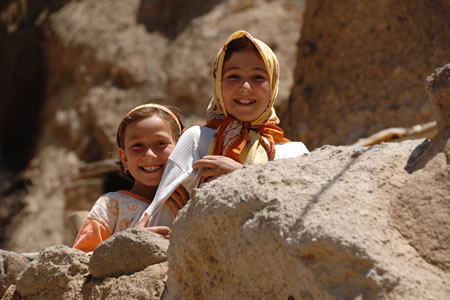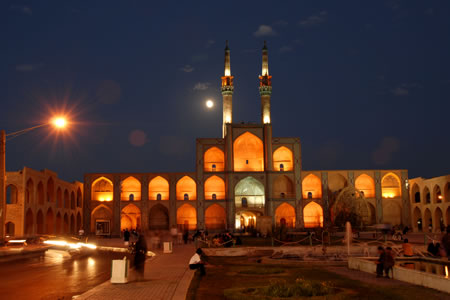

| Iran: Flashback | |
Zahedan (Iran), July 31st 2007 |
|
Just before entering Pakistan, we want to look back at the daily matters that are conspicuous for travelling through Iran. When thinking of Iran as travel destination, many people think of the things that are not possible in this country. Due to Islamic law, women cannot dress in the way they normally dress back home, lying in your bikinis on a public beach is out of the question, eating pork is forbidden just as drinking alcohol. So when you need a good glass of wine to have a good holiday, Iran may not be the country for you. If those things don’t put you off, Iran has a lot to offer. Iranians have a sweet tooth and on nearly every street corner you will find patisseries with lovely pastries. Our (budget) hotels normally do not offer breakfast. A good excuse to eat a nice box of pastries for breakfast! For less than € 0.25 p.p. you have got enough fuel for the entire morning. When you have bought you box of pasties, you can eat those in one of the many parks of Iran. These parks are extensively used by the Iranians who are looking for some company or some shade. After spending some time in Iran, you will know one thing: on every place where Iranians gather you will find tea. In the busy parks there is always a old man with a gas burner and a large kettle to sell tea to the thirsty ones. The sugar cubes are delivered without teaspoon because Iranians are putting the sugar cube between their teeth while they are drinking the hot tea. This way of drinking tea needs some practice. The first time, your sugar cube only lasts a few seconds before it is melted. After some training, your cube will last the entire cup of tea or even longer. Parks are especially busy in the late afternoon, in particular on Fridays. (Thursday afternoon and Friday are the weekend days in Iran) Whole families with uncles, aunts, nephews and nieces are going to the park for a picnic. Their standard gear contains a large mat on which everyone sits (without shoes!), a samovar (large, silver coloured, kitschy teapot that keeps tea on a constant hot temperature) and food. Iranians love food! When you are invited at someone’s home or on the picnic mat, you will not have to wait long before you are offered tea and something to eat. The food can vary from an extensive meal to an overdose of fruit. The large, sweet and sappy watermelons are the favourite. |
|
 |
|
Smiling faces welcome you everywhere in Iran, like here in Kandovan. |
|
One of the customs that you should take into account is Ta’arof. When people are offering you something, you should first refuse it several times before you accept it. While this may seem a waste of time, it’s a nice habit that is never misused. It makes it possible for poorer people to show their good intentions by offering a meal, while they are also able to retract this offer if they cannot pay for this meal. In this way, nobody has to lose face. As a rule of the thumb you can say that you have to refuse an offer three times before you accept it. Ta’arof is found everywhere, also in shops and by taxi drivers. So remember that its Ta’arof when a shopkeeper says that you don’t have to pay for the shampoo and toothpaste that you ordered at the shop counter. Don’t leave without paying! Although some invitations are Ta’arof, you don’t need great charms to be invited in someone’s house. People like to make new foreign friends and are very hospitable. People always like to have a little chat. When you are walking down de streets, you will hear people whispering some English sentences to practice. After a while, they feel confident and then they will ask: “Hello Mister, where are you from?” Iranian men normally start the conversation by addressing to the man first. When the man has introduced his wife, she can participate in the conversation. Occasionally, Iranian men answer the questions of a woman to her man. This is not because Iranian men do not like to talk with women, but they just want to be polite by not getting to direct contact with another man’s wife. Conversations are about various subjects, but a subject that always recurs is your opinion about their country. They do not just want to know how you see their country after your visit, but they especially want to know how you thought about Iran before you visited it. People are normally proud of their country with its rich history. While Iranians are very hospitable, they are afraid that people from the West see them as “savage people”. Several times we were asked literally: “Do people in your country think that we are savage people that are cruel?”. This was strange to hear. Off course, Western governments and the Iranian government are having their disagreements once in a while but media reports are not about the savage and cruel character of the Iranians. On our question why Iranians thought that we might have this opinion, the film 300 was frequently mentioned. This Hollywood film is about the Persian invasion of Greece in earlier times. While this film is not shown in the Iranian cinema, it is said that the film imputes a cruel and savage character to the Iranians. Therefore, this movie is seen as pure propaganda against Iran. The idea that the all Western countries are against Iran lives strongly, not just because of that film. Although many Iranians know that their country has its problems, they want that Iran can decide for itself which way they want to go. They don’t like to be lectured and certainly not by the USA. The USA is the collective enemy, which is used to keep the people behind the government. However, Iranians do discriminate between the American government and the American people. With the latter they would certainly want to drink some tea or share a watermelon. |
|
 |
|
The Amir Chakhmaq complex in Yazd attracts many local people at the end of the day. |
|
| Because we value the contacts with the local people very high, we often opt for the budget hotels in which the Iranians are also staying. Rooms are shared by large families including grandfathers and grandmothers. The children make sure that there is a lively atmosphere. The beds are displaced in a way that a mat can be put on the floor to sit on. Normally the doors are left open, but you can also see that there are a lot of people inside when the door is closed. Iranians leave the slippers that they use for visiting the kitchen or toilet outside the room to keep their own room clean. These families stay for longer periods in the hotels because the man of the house has a temporary job in this city. Therefore, hotels normally have a shared kitchen that every guest can use. Unfortunately, the kitchen and the shared bathrooms aren’t always clean. But you cannot expect allot for a double room of between € 4 and € 6 per night.
For travelling between the cities we normally use the bus. Iran has a good bus system with old Mercedes busses and newer Volvo or Scania busses. Travelling by bus is cheap. The four-hour journey between Maku and Tabriz costs € 0,40 per person when using a Mercedes bus. The prices of a ticket on a Volvo are normally 80% higher, but usually include a small snack like some cookies or nuts. The main advantage of the Volvo busses is the air-conditioning. In some occasions this can be a disadvantage. On the trip from Qazvin to Esfahan, the air-conditioning was a little to active causing an inside temperature of 15 degrees while it was well over 30 degrees outside. Nevertheless, travelling by public transport in Iran is very comfortable. Hence we had a special and very good time while travelling through Iran. When telling Iranians how much we like their country, every word is sincere. People are justly proud when we tell them that the contact with the Iranians is the main highlight of a trip to Iran. Six weeks is too short to see the entire country, but maybe we are coming back again after a few years to see the state of the country at that time. © copyright - Babakoto.eu / 2007 |
|